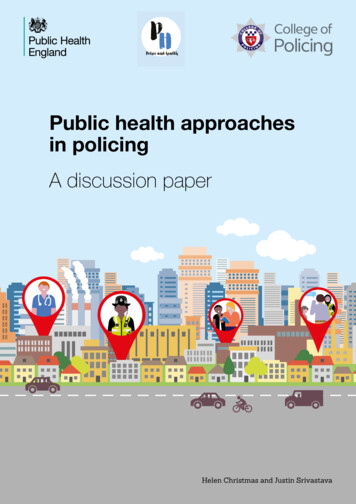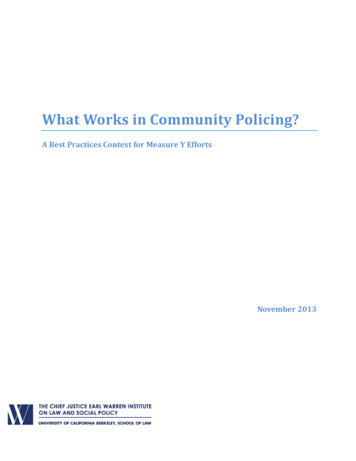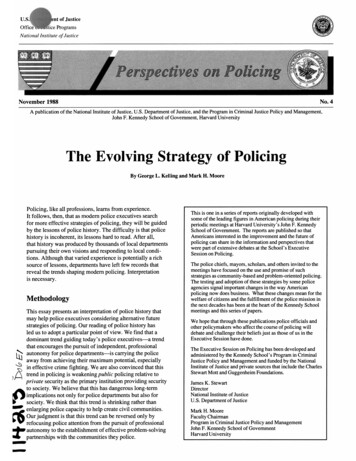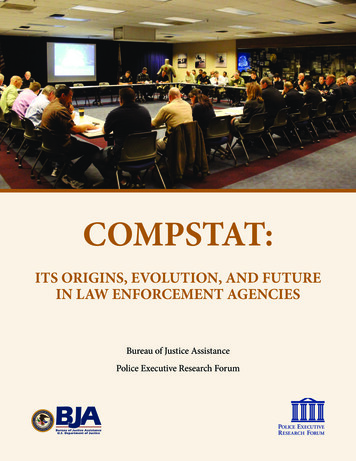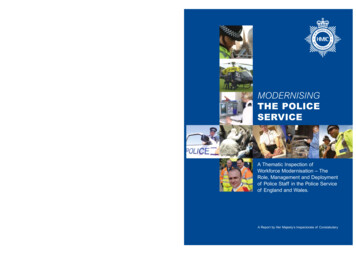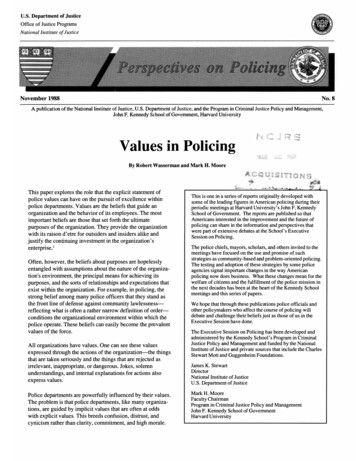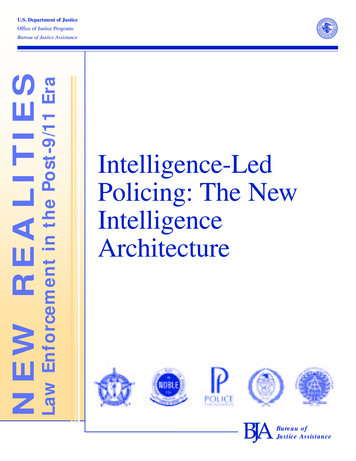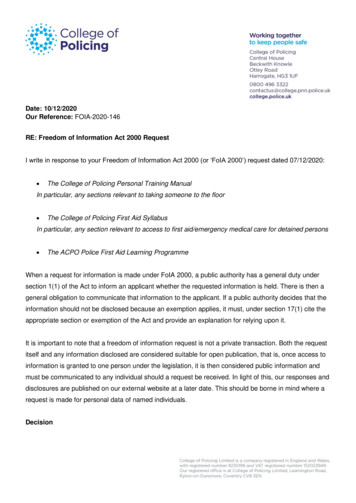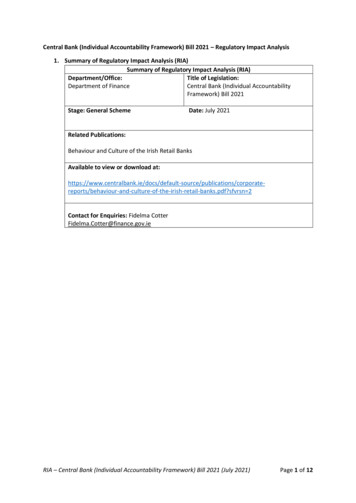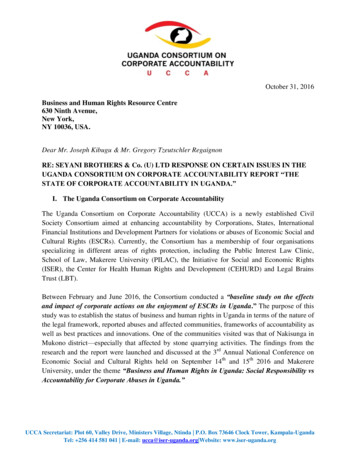
Transcription
Committee onStandards inPublic LifeLocal Policing – accountability, leadership and ethicsIssues and Questions paperCommittee onStandards inPublicLifeandThe Police Reform and Social Responsibility Act 2011 enabled the election of thefirst PoliceCrime Commissioners (PCC)s in November 2012. Elected PCCs would, in the words of the thenPolice Minister Nick Herbert, ‘swap the bureaucratic control of the police for democraticaccountability’ which would ‘benefit police and public alike.’ Section 14 of the Policing Protocol2011 makes clear:The public accountability for the delivery and performance of the police service is placedinto the hands of the PCC on behalf of their electorate. The PCC draws on their mandate toset and shape the strategic objectives of their force area in consultation with the ChiefConstable. They are accountable to the electorate; the Chief Constable is accountable totheir PCC. The [Police and Crime] Panel within each force area is empowered to maintain aregular check and balance on the performance of the PCC in that context.The Policing Protocol also makes clear at section 10 that ‘All parties will abide by the sevenprinciples set out in Standards in Public Life: First Report of the Committee on Standards inPublic Life (a) (known as the “Nolan Principles”).’ The Seven Principles of Public Life areSelflessness, Integrity, Objectivity, Accountability, Openness, Honesty and Leadership.In January 2014 the National Audit Office published a review of the police accountabilitylandscape, examining ‘whether the Department’s chosen framework is sufficient for providingassurance for value for money in the police service and operating as intended.’ Naturally, giventhe remit of the NAO, the focus of their report was on assurance for value for money. It was notwithin their scope to consider the extent to which the accountability framework for policing wassufficient for providing assurance that the Seven Principles of Public Life were being observed.The Committee on Standards in Public Life, which advises the Prime Minister on ethicalstandards across public life in the UK, is responsible for monitoring and reporting on issuesrelating to the standards of conduct of all public office holders. The category of public officeholder includes members of the police service, Police and Crime Commissioners and members of1
Police and Crime Panels. It is clearly within our remit to consider the accountability frameworkfor policing in the context of ethical standards.In our report Standards Matters, published in January 2013, just months after the first PCCelections, we noted the risks arising from new ways of delivering public services, includingpolicing. We stated then that ‘It is essential to take care in all these cases [where new modelsare introduced] to design governance structures which actively promote the right ethicalbehaviour’ and that ‘We intend to monitor the extent to which PCCs are genuinely open andaccountable and how successfully any ethical risks (such as conflicts of interest) arising fromtheir role are addressed.’We have decided that the time is right to undertake a review of how ethical standards are beingaddressed in the police accountability landscape. There are three reasons for doing this now.Firstly, as with any new system, it is sensible to review its operation to test how well it is livingup to its original rationale and at this point we have the benefit of nearly two years of evidenceon which to base any judgements. Secondly, the new system as a whole, and individualelements of it, have been the subject of criticism, much of it arising from standards issues, yetthe relationship between standards and governance structures has been relativelyunderexplored; more needs to done to consider how governance structures can promote ethicalbehaviour and limit ethical risks. And finally, in the light of recent scandals and criticisms, allpolitical parties have indicated that they are likely to make further changes to the policeaccountability framework. We believe any changes should be informed by the widest possiblerange of evidence – evidence on efficiency, on effectiveness, on value for money, on democraticaccountability and on public confidence in standards in public life.This inquiry by the Committee on Standards in Public Life sits alongside the work already doneby the National Audit Office, and is being conducted alongside a review of police leadership bythe College of Policing, a review of the police disciplinary system by Major General CliveChapman, a review of police complaints, a consultation on whistleblowing, and a review of theanti-corruption capability in all police forces by Her Majesty’s Inspectorate of Constabulary. Asubstantial evidence base on accountability in policing is being constructed.Our contribution, in this inquiry, will be to focus on the public accountability structures of thepolice. The reviews announced by the Home Secretary in July 2014 focus on the systems thathold police officers to account; we will complement her work by looking at accountability inpolice governance from a standards point of view. In particular, we will look at what structuresare in place for ensuring ethical standards in the conduct and operation of Police and CrimePanels, Police and Crime Commissioners, and Chief Constables. We will then go on to considerhow effective those structures are, identify what works well and, where there are shortcomings,what we would expect to see – in any model for police accountability. We will be seeking thenecessary assurance that ethical standards in public life are, and are capable of being, upheld.Whether a new model of policing accountability and governance is introduced, or whether theexisting model is modified or stays the same, it essential that the model is capable of promoting2
ethical behaviour, reducing ethical risks and providing effective accountability in order tocommand public confidence.The Committee would like to receive your answers to some or all of the questions set outin this paper.Please send in your response by no later than noon on 30 November 2014. Details on how tosubmit your response can be found at the bottom of the call for evidence.Background1. Our policing system relies on policing by consent in ways that meet the differing needs andpriorities of communities. Operational decisions are taken by Chief Constables, who are held toaccount through democratic scrutiny, which over time has taken various forms – watchcommittees, police committees, two forms of police authorities and now Police and CrimeCommissioners. The changing forms of oversight are evidence of the difficult and continuingtensions in achieving democratic scrutiny that commands public trust and confidence inoperational policing.2. Police and Crime Commissioners (PCCs) replaced Police Authorities in 2012 as ‘the voice of thepublic’ and as a means of improving the accountability and transparency of the police to theirlocal communities. As the Home Secretary recently said “the purpose of directly-elected policeand crime commissioners was clear. They’d be elected, visible, well-known in their communitiesand accountable to the electorate.”1 When PCCs were elected across England and Wales on 15November 2012 the average voter turnout was low at 15.1 % and this has raised questions aboutthe validity of the role and the extent of their electoral mandate. This debate has continuedfollowing the recent election of the PCC in the West Midlands where the voter turnout was10.4%. Police and Crime Panels were also established as a means of ensuring that PCCs would besubject to “effective scrutiny and appropriate checks and balances” by local representatives onbehalf of the public.23. The Government has pursued other significant reforms of policing including establishing theCollege of Policing in 2012 to set standards of professional practice, promote ethics, values andstandards of integrity and provide training and identify and promote best practice. Morerecently the Home Secretary has announced reviews of the Police Disciplinary System and PoliceComplaints System and a consultation on whistleblowing.3 This has been in the face of publicconcern in recent years over police standards including “Hillsborough, Orgreave Colliery, theinvestigation of the murder of Stephen Lawrence and how police conducted themselvesafterwards, the resignation of a Cabinet Minister as a result of the actions of at least one1Speech by Home Secretary Theresa May to Policy Exchange about Police and Crime Commissioners. Delivered on 7 November 2013.Available at: cing in the 21st Century: Reconnecting police and the people Cm 7925 July 20103July 2014 Oral statement to Parliament. Available at: ary-on-police-reform3
dishonest police officer, the sexual deception of citizens who trusted undercover police officers,and others”. 4 Most recently concerns have been raised about the safeguarding of children inRotherham and the accountability of the South Yorkshire PCC.4. Questions have been asked about the ‘gaming’ of police recorded crime statistics.5 The PoliceFederation has been scrutinised, with the Independent Review of the Police Federation ofEngland and Wales concluding that fundamental reform of the Federation’s culture, behaviours,structures and organisation was required to rebuild the trust of its members and the public.6 Theconduct of individual PCCs has also been the subject of criticism.75. Earlier this year the Public Administration Select Committee (“PASC”) were inquiring into policerecorded crime statistics and argued that there was “lax police compliance with the agreednational standard of victim-focussed crime recording”. PASC concluded that “The quality ofleadership within the police, and its compliance with the core values of policing, includingaccountability, honesty and integrity, will determine whether the proper quality of policerecorded crime (PRC) data can be restored”. PASC recommended that:“.the Committee on Standards in Public Life conducts a wide-ranging inquiry into thepolice's compliance with the new Code of Ethics; in particular the role of leadership inpromoting and sustaining these values in the face of all the other pressures on the force.” 86. The Committee have considered seriously this recommendation in framing the scope of thisinquiry and the Committee will consider specifically the extent to which PCCs are providingethical leadership in embedding the Policing Code of Ethics, and are themselves acting withinthat framework as elected officials.7. The Home Secretary has said PCCs “would bring – probably for the first time ever – real localscrutiny of how Chief Constables and their forces perform.” With regards to the extent they haveachieved this; the Home Secretary has acknowledged the picture was “a little mixed9”.4HMIC 2014 State of Policing: The Annual Assessment of Policing in England and Wales2012/13 tate-of-policing-12-13.pdf5Questions were raised about the integrity of police recorded crime statistics in 2012 and it was acknowledged by the Office for NationalStatistics (ONS) that the recorded crime figures in their National Crime Survey reported in January 2013 might be defective since the ONSrelied on figures reported to them by police forces. HMIC’s latest report into crime statistics published in May 2014 ‘Crime recording: Amatter of fact. An interim report of the inspection of crime data integrity in police forces in England and Wales’ said that there was aproblem in some forces of weak or absent management and supervision of crime-recording, significant under-recording of crime, andserious sexual offences not being recorded. Problems continue to emerge in some forces, for example, after an HMIC inspection, concernswere raised that there are rapes misreported as ‘no crime’ in Northumbria. The Chief Constable and Police and Crime Commissioner areinvestigating. See link for more details: p?id 9790862014 Police Federation Independent Review. Available at:http://www.thersa.org/ data/assets/pdf file/0004/1538230/RSA Police Federation Report WEB.pdf7For example, the PCC in Newport was accused of bullying a Chief Constable into retiring. The case has raised concerns about the processand power of PCCs being able to fire Chief Constables. Ann Barnes, Police and Crime Commissioner in Kent, was criticised for beingineffective and inadequately describing her role on ‘Meet the Police and Crime Commissioner’ on Channel 4. The Police and Crime Paneldecided that letters received afterwards from the public received airing concerns were to be treated as routine correspondence and notofficial complaints.8Public Administration Select Committee 2014 Caught red-handed: Why we can’t count on Police Recorded Crime statistics’. Available 14/cmselect/cmpubadm/760/760.pdf9Speech by Home Secretary Theresa May to Policy Exchange about Police and Crime Commissioners 2013. Available nd-crime-commissioners-one-year-on-warts-and-all4
The current accountability structuresThe role of Police and Crime Commissioners8. The role of Police and Crime Commissioner is a central component of new police governancearrangements provided for in the Police Reform and Social Responsibility Act 2011 (“PRSRA”).PCCs are intended to improve local accountability and increase local autonomy in policing. Theyreplaced police authorities and are elected rather than appointed and are therefore directlyaccountable to the voters in their locality.10 They are elected for a set four year term of officewith a limit of two terms. PCCs can be disqualified from holding office on certain grounds, suchas being the subject of debt or bankruptcy conditions or on conviction of a criminal offence.They can resign their post. They can only be suspended by their Police and Crime Panel incircumstances where the PCC has been charged with a criminal offence which carries amaximum term of imprisonment exceeding two years.119. The Home Office states that the role of a PCC is to ensure the policing needs of theircommunities are met as effectively as possible, bringing communities close to the police,building confidence in the system and restoring trust.12 Their objective is to cut crime and deliveran effective and efficient police service in their police force locality by:Holding the Chief Constable to account for the delivery of the forceSetting and updating a police and crime planSetting the force budget and precept13Regularly engaging with the public and communitiesAppointing, and where necessary dismissing, the Chief Constable.10. Each PCC is designated a “corporation sole” under the PRSRA (as are Chief Constables). Thismeans that they have a separate legal personality from the person holding the role and they areable to employ staff, own property, hold funds and enter into contracts. The PRSRA providesthat PCCs may appoint a deputy PCC to exercise any of their functions.14 There are somerestrictions on who can be appointed as a deputy but significantly the Act states that Schedule 7of the Local Government and Housing Act 1989 (appointment of staff on merit) does not applyto the appointment of a deputy PCC.15 This means that the recruitment of deputy PCCs differsfrom the majority of public officials who are either elected or appointed as non-political officialsfollowing the Commissioner for Public Appointments’ Code of Practice, both mechanismsproviding a means of assurance to the public through an appointment process which is open andtransparent. The check on this power of appointment is that the PCC is required to notify the10PCCs were introduced in 41 of 43 police forces in England and Wales, separate arrangements exist in the Metropolitan Police Serviceand the City of London Police.11Police Reform and Social Responsibility Act 2011 sections 30, 61 and 67.12Home Office Have you got what it takes? Your role as a Police and Crime Commissioner Available loads/attachment data/file/117463/role-as-pcc.pdf13Precept is the amount of the Council Tax budget that goes to the local police force.14There are some excepted functions listed in section 18(3)(b). Available ion/18/enacted15Police Reform and Social Responsibility Act 2011. Available at: n/18/enacted5
Police and Crime Panel of the proposed appointment, the criteria used to assess their suitabilityand how the criteria were satisfied. The Police and Crime Panel is required to review theproposed appointment and make a recommendation to the PCC as to whether or not thecandidate should be appointed which the PCC may choose to accept or reject. The frameworkfor appointing deputies raises the question of whether the process presents an ethical risk.1611. One of the key aspects of the role of the PCC is to open their force to greater transparency. ThePRSRA provides that the PCC, as an “elected local policing body” must issue a police and crimeplan within the financial year an election is held. This plan includes:a. their police and crime objectivesb. financial and other resources providedc. the means by which the Chief Constable will report to the PCC andd. how the Chief Constable’s performance will be measured.The PCC must also produce an annual report and publish information considered necessary toenable people living in the local area to assess the performance of the Chief Constable inexercising their functions. Just as important is for PCCs to be (and seen to be) transparent andopen about their performance and they have a duty under section 11(1) PRSRA to publishspecified information relating to the exercise of their functions and be transparent in theirdecision making.17 PCCs have a duty to engage with the public and local communities, put outgood information and create a genuine dialogue.12. A Home Affairs Committee (“HAC”) report published in May 2014 ‘Police and CrimeCommissioners: progress to date’ noted a concern that the Home Office and the Association ofPolice and Crime Commissioners provide relatively little comparative analysis that might helpthe general public to assess the actions and decisions of their commissioners against eachother.18 For instance, recently PCCs have been negotiating the transfer of police staff, assets andliabilities that were formerly employed or held by police authorities and have adopted a range ofapproaches to the process, but it is difficult to compare these approaches. The report concludedthat it was too early to determine whether the introduction of PCCs has been a success andmade several recommendations centred on strengthening Police and Crime Panels, training forPCCs and discouraging use of targets. It was noted that many PCCs (18 out of 41) were holdingChief Constables to account using targets. There is a more general concern that targets canintroduce perverse incentives and a performance culture to meet targets.1913. Her Majesty’s Inspectorate of Constabulary (HMIC) which continues to be responsible forinspecting the efficiency and effectiveness of police forces and previously had responsibility forinspecting police authorities, has no such jurisdiction in relation to PCCs. However PCCs cancommission HMIC to investigate an issue. HMIC does provide PCCs and the public with16The Commissioner for Public Appointments 2012. The Code of Practice. Available ice-20121.pdf17See The Elected Local Policing Bodies(Specified Information) Order 2011 S.I. No. 2011/305018Home Affairs Committee 2014 Police and Crime Commissioners: progress to date. Available 14/cmselect/cmhaff/757/757.pdf19Loveday, B 2008 ‘Performance Management and the Decline of Leadership within Public Services in the United Kingdom’. Policing 2 (1)pp 120-130.6
“information, analysis, judgements and recommendations which can be used to understandpolice performance and so establish how well forces are doing with taxpayers’ money”.2014. The PRSRA, the Financial Management Code of Practice issued under section 17 PRSRA and thePolicing Protocol 2011 form part of comprehensive framework for governance in every area.21These are:the relationship between the PCC and the Chief Constable and how their functions will beexercised in relation to each otheran independent audit committeePolice and Crime Panels.The relationship between the PCC and the Chief Constable15. The Government intends PCCs to be responsible for the “totality of policing within their forcearea” they set the strategic direction and objectives of the police force whilst operationaldelivery, including the direction and control of police officers and staff, is designated solely tothe Chief Constable.22 The Policing Protocol 2011 sets out some examples of what is meant byoperational matters including the appointment or dismissal of officers or the investigation ofcrime and “decisions taken with the purpose of balancing competing operational needs withinthe framework of priorities and objectives set by the PCC.”23 The list is not exhaustive and it istherefore for PCCs and Chief Constables to use their working relationship to safeguardoperational independence and agree where the boundaries lie between their respective roles.24,25The Chief Constable is responsible for remaining politically independent of their PCC and thePCC must not fetter the operational independence of the police force and Chief Constable. Asthe Protocol acknowledges: “an effective, constructive working relationship is more likely to beachieved where communication and clarity of understanding are at their highest” but thisambiguity in the respective roles presents a risk of potential disagreement or conflict.16. According to the Home Office, “the relationship between the PCC and Chief Constable is definedby the PCC’s democratic mandate to hold the Chief Constable to account, and by the lawitself”.26 The PRSRA provides that PCCs must hold Chief Constables to account for, amongstother things, the overall performance of the force including against the priorities set out in thepolice and crime plan, the performance of officers and staff and the exercise by the ChiefConstable of his functions. The Chief Constable is accountable to the law for the exercise ofpolice powers and to the PCC for the delivery of efficient and effective policing, management of20HMIC 2014 State of Policing: The Annual Assessment of Policing in England and Wales2012/13 tate-of-policing-12-13.pdf21As part of the Home Office accounting officers assurance framework for obtain the necessary assurances for Parliament where thedepartment funds other bodies on a decentralised basis. Home Office 2013 Financial Management Code Of Practice for The Police Serviceof England And Wales ds/attachment data/file/228960/9780108511332.pdf22The Policing Protocol Order 2011 S.I. 2011 No. 2744 Available oads/attachment 24ibid25Home Office Have you got what it takes? Working with and holding your chief constable to account26Home Office 2013 Financial Management Code of Practice for the Police Forces of England and Wales7
resources and expenditure by the police force.27 However, it is up to each PCC to decide howpractically they will hold the police to account on behalf of the public. In order to do soeffectively, PCCs must also be in receipt of high quality information, although the legislationdoes not specify where they must obtain this from.17. The PCC is responsible for monitoring all complaints made against officers and staff and dealingwith complaints against the Chief Constable. Section 38 of the PRSRA outlines the rights of thePCC to dismiss a Chief Constable, whilst Schedule 8 sets out the procedure for doing so, includingrequiring PCCs to give a description of their reasons for dismissing a Chief Constable both to theChief Constable and the Police and Crime Panel.28 This duty has been subject to some criticism.29Audit committees18. Whilst the PCC is accountable to the public for the allocation of the police funding, both the PCCand Chief Constable are responsible for ensuring the effective management of the policingbudget and securing value for money. The PRSRA requires every PCC outside London to appointa person to be responsible for the proper administration of the commissioner’s financial affairs,referred to as the Chief Finance Officer.3019. The Chief Constable has day to day responsibility for managing their allocated budgets and mustalso have adequate financial governance in place. It is encouraged that, where possible, forcesand the Office of Police and Crime Commissioner should have joint Audit Committees withbetween three and five members who are independent of police.31 There have been some casesof forces and Offices of PCCs employing a joint Chief Financial Officer. The Chartered Institute ofPublic Finance and Accountancy (CIPFA) has stated that these offices will have to satisfythemselves that any conflict of interest can be effectively managed.32 The National Audit Officealso raised this as a potential conflict of interest in its report published in January Policeaccountability: Landscape review.3320. Audit Committees provide an independent scrutiny function. It is for the Audit Committee toestablish their own terms of reference but best practice from CIPFA would suggest its corefunctions would include risk management, governance, internal control, consideration ofinternal and external audit reports, annual accounts and financial statements. The Association ofPolice and Crime Commissioners (APCC) indicates that a large proportion of the terms of27Home Office 2011 The Policing Protocol Order 2011. Available loads/attachment ce Reform and Social Responsibility Act 2011. Available at: n/38/enacted29Home Affairs Committee Police and Crime Commissioners: progress to date paras 68-7830Police Reform and Social Responsibility Act 2011 Schedule 1 Section 1. Available edule/1/enacted#schedule-1-paragraph-631Home Office 2012 Financial Management Code Of Practice for The Police Service of England And uploads/attachment data/file/228960/9780108511332.pdf32Scott, A 2012 Accompanying letter to Statement on the role of the chief finance officer. Available at: er.pdf See also CIPFA Statement on the role of thechief finance officer 2012. Available at: ports/role%20of%20cfo%20police.pdf33HC 963 Session 2013-14 22 January 20148
reference of PCC Audit Committees not only cover these traditional areas, they also extend tomatters such as ensuring value for money is achieved, health and safety and more unusuallyprofessional standards and ethics.34 There may be a question as to whether the audit committeeis the most appropriate body for consideration of standards and ethical issues.Police and Crime Panels21. PCCs are scrutinised locally by Police and Crime Panels which regularly review or scrutinise theperformance of the PCC and the exercise by the PCC of their functions. There is a statutoryrequirement for the panel to be balanced to represent all parts of and reflect the political makeup of the local area and have the skills, knowledge and experience necessary to discharge itsfunctions effectively. Police and Crime Panels are made up are made up of at least one electedrepresentative from each local authority within the police force area and two independent cooptees, with a minimum of 10 representatives from the local authorities in the force area and amaximum total number of 20 panel members.35 It has been suggested that the requirement, inparticular, to have a politically “balanced” panel may have implications for the effective scrutinyof the PCC. The panel that shares the same political allegiance as the PCC may tend to “support”rather than “scrutinise” and the panel with a political difference to the PCC may be moreadversarial.3622. As referred to above, Police and Crime Panels are charged with both challenging and supportingPCCs. Section 28(2) of the PRSRA states that the PCP’s various statutory functions “must beexercised with a view to supporting the effective exercise of the functions of the police andcrime commissioner”.37 The key functions of Police and Crime Panels are:Confirming or vetoing the PCC’s appointment of Chief ConstableConfirming or vetoing the level of the council tax precept38Reviewing the police and crime plan, annual report and both scrutinising andsupporting the activities of the PCC in holding the Chief Constable to account39Responsibility for complaints about a PCCReviewing appointments of senior staff within the office of the PCC including theDeputy PCC.In order to veto an appointment of the Chief Constable or the precept, at least two thirds of thepanel will have to agree. Although the panel has responsibility for considering complaints againstPCCs or their deputies, if a criminal office is alleged the panel must refer the matter to theIndependent Police Complaints
the College of Policing, a review of the police disciplinary system by Major General Clive Chapman, a review of police complaints, a consultation on whistleblowing, and a review of the . concern in recent years over police standards including Hillsborough, Orgreave Colliery, the investigation of the murder of Stephen Lawrence and how police .
